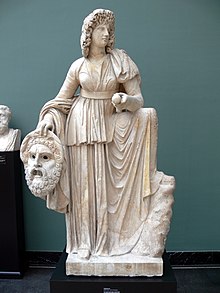Melpomene
This article needs additional citations for verification. (April 2014) (Learn how and when to remove this template message) |


Melpomene (/mɛlˈpɒmɪniː/; Ancient Greek: Μελπομένη, romanized: Melpoménē, lit. 'to sing' or 'the one that is melodious'), initially the Muse of Chorus, she then became the Muse of Tragedy, for which she is best known now.[1] Her name was derived from the Greek verb melpô or melpomai meaning "to celebrate with dance and song." She is often represented with a tragic mask and wearing the cothurnus, boots traditionally worn by tragic actors. Often, she also holds a knife or club in one hand and the tragic mask in the other.
Melpomene is the daughter of Zeus and Mnemosyne. Her sisters include Calliope (muse of epic poetry), Clio (muse of history), Euterpe (muse of lyrical poetry), Terpsichore (muse of dancing), Erato (muse of erotic poetry), Thalia (muse of comedy), Polyhymnia (muse of hymns), and Urania (muse of astronomy). She is also the mother of several of the Sirens, the divine handmaidens of Kore (Persephone/Proserpina) who were cursed by her mother, Demeter/Ceres, when they were unable to prevent the kidnapping of Kore (Persephone/Proserpina) by Hades/Pluto.
In Greek and Latin poetry since Horace (d. 8 BC), it was commonly auspicious to invoke Melpomene.[2]
See also[edit]
References[edit]
- ^ Blyth, Charles (1990), Virgilian Tragedy and Troilus, 24, The Chaucer Review, pp. 211–218
- ^ Bruce Merry, Encyclopedia of Modern Greek Literature (Santa Barbara CA: Greenwood Publishing Group, 2004), 269-70. ISBN 0313308136
External links[edit]
 Media related to Melpomene at Wikimedia Commons
Media related to Melpomene at Wikimedia Commons- Primary sources and basic information concerning Melpomene
- Warburg Institute Iconographic Database (ca 50 images of Melpomene)
| This article relating to a Greek deity is a stub. You can help Wikipedia by expanding it. |